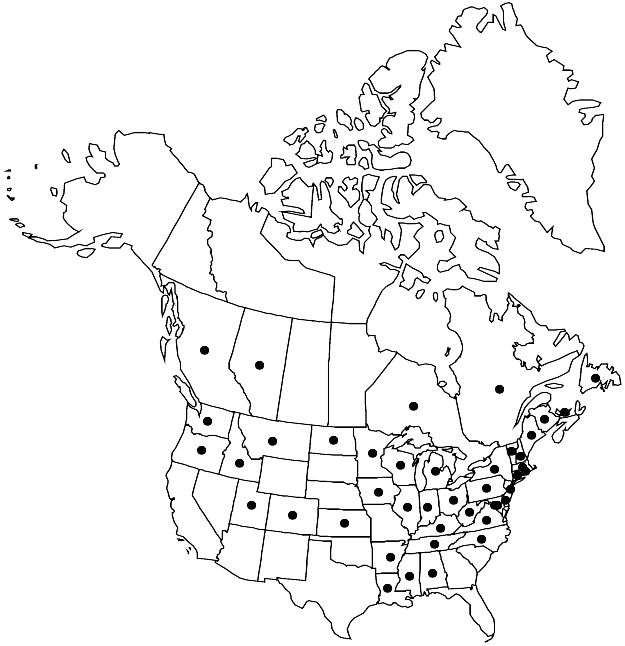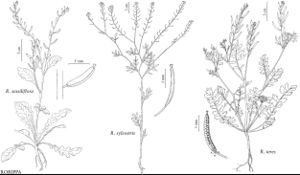Difference between revisions of "Rorippa sylvestris"
Enum. Pl., 27. 1821.
FNA>Volume Importer |
imported>Volume Importer |
||
| (3 intermediate revisions by 2 users not shown) | |||
| Line 6: | Line 6: | ||
|place=27. 1821 | |place=27. 1821 | ||
|year=1821 | |year=1821 | ||
| + | }} | ||
| + | |special_status={{Treatment/ID/Special_status | ||
| + | |code=W | ||
| + | |label=Weedy | ||
| + | }}{{Treatment/ID/Special_status | ||
| + | |code=I | ||
| + | |label=Introduced | ||
| + | }}{{Treatment/ID/Special_status | ||
| + | |code=F | ||
| + | |label=Illustrated | ||
}} | }} | ||
|basionyms={{Treatment/ID/Basionym | |basionyms={{Treatment/ID/Basionym | ||
|name=Sisymbrium sylvestre | |name=Sisymbrium sylvestre | ||
|authority=Linnaeus | |authority=Linnaeus | ||
| + | |rank=species | ||
|publication_title=Sp. Pl. | |publication_title=Sp. Pl. | ||
|publication_place=2: 657. 1753 | |publication_place=2: 657. 1753 | ||
| Line 16: | Line 27: | ||
|name=Brachiolobos sylvestris | |name=Brachiolobos sylvestris | ||
|authority=(Linnaeus) Allioni | |authority=(Linnaeus) Allioni | ||
| + | |rank=species | ||
}} {{Treatment/ID/Synonym | }} {{Treatment/ID/Synonym | ||
|name=Nasturtium sylvestre | |name=Nasturtium sylvestre | ||
|authority=(Linnaeus) W. T. Aiton | |authority=(Linnaeus) W. T. Aiton | ||
| + | |rank=species | ||
}} {{Treatment/ID/Synonym | }} {{Treatment/ID/Synonym | ||
|name=Radicula sylvestris | |name=Radicula sylvestris | ||
|authority=(Linnaeus) Druce | |authority=(Linnaeus) Druce | ||
| + | |rank=species | ||
}} | }} | ||
|hierarchy=Brassicaceae;Brassicaceae tribe Cardamineae;Rorippa;Rorippa sylvestris | |hierarchy=Brassicaceae;Brassicaceae tribe Cardamineae;Rorippa;Rorippa sylvestris | ||
| Line 37: | Line 51: | ||
|elevation=0-2500 m | |elevation=0-2500 m | ||
|distribution=Alta.;B.C.;N.B.;Nfld. and Labr. (Nfld.);Ont.;P.E.I.;Que.;Ala.;Ark.;Colo.;Conn.;Del.;D.C.;Idaho;Ill.;Ind.;Iowa;Kans.;Ky.;La.;Maine;Md.;Mass.;Mich.;Minn.;Miss.;Mo.;Mont.;N.H.;N.J.;N.Y.;N.C.;N.Dak.;Ohio;Oreg.;Pa.;R.I.;Tenn.;Utah;Vt.;Va.;Wash.;W.Va.;Wis.;Europe;sw Asia;introduced also in South America. | |distribution=Alta.;B.C.;N.B.;Nfld. and Labr. (Nfld.);Ont.;P.E.I.;Que.;Ala.;Ark.;Colo.;Conn.;Del.;D.C.;Idaho;Ill.;Ind.;Iowa;Kans.;Ky.;La.;Maine;Md.;Mass.;Mich.;Minn.;Miss.;Mo.;Mont.;N.H.;N.J.;N.Y.;N.C.;N.Dak.;Ohio;Oreg.;Pa.;R.I.;Tenn.;Utah;Vt.;Va.;Wash.;W.Va.;Wis.;Europe;sw Asia;introduced also in South America. | ||
| + | |introduced=true | ||
|tables= | |tables= | ||
|references= | |references= | ||
| Line 45: | Line 60: | ||
-->{{#Taxon: | -->{{#Taxon: | ||
name=Rorippa sylvestris | name=Rorippa sylvestris | ||
| − | |||
|authority=(Linnaeus) Besser | |authority=(Linnaeus) Besser | ||
|rank=species | |rank=species | ||
| Line 60: | Line 74: | ||
|publication title=Enum. Pl., | |publication title=Enum. Pl., | ||
|publication year=1821 | |publication year=1821 | ||
| − | |special status= | + | |special status=Weedy;Introduced;Illustrated |
| − | |source xml=https:// | + | |source xml=https://bitbucket.org/aafc-mbb/fna-data-curation/src/2e0870ddd59836b60bcf96646a41e87ea5a5943a/coarse_grained_fna_xml/V7/V7_789.xml |
|tribe=Brassicaceae tribe Cardamineae | |tribe=Brassicaceae tribe Cardamineae | ||
|genus=Rorippa | |genus=Rorippa | ||
Latest revision as of 22:36, 5 November 2020
Perennials; glabrous or sparsely pubescent. Stems prostrate, decumbent, ascending, or suberect, branched mainly basally, (0.5–)1.5–8(–10) dm. Basal leaves not rosulate; similar to cauline. Cauline leaves petiolate, or (distal) often subsessile; blade deeply pinnatisect, (lobes 3–6 on each side, sublinear, lanceolate, oblong, elliptic, or ovate), (2–)3.5–15(–20) cm × (7–)10–45(–60) mm, base usually not auriculate, rarely minutely auriculate, margins dentate, serrate, subentire, or (distally) pinnatisect, (lobes 1–3 on each side). Racemes elongated. Fruiting pedicels divaricate, straight, (3–)4–10(–12) mm. Flowers: sepals ascending or spreading, oblong, 1.8–3(–3.5) × 0.7–1.5 mm; petals yellow, spatulate or obovate, (2.2–)2.8–5.5(–6) × 1.5–2.5 mm; median filaments (1.5–)1.8–3.5(–4) mm; anthers oblong, 0.7–1 mm. Fruits siliques, straight, usually linear, rarely oblong-linear, 10–20(–25) × (0.7–)1–1.3(–1.6) mm; valves glabrous; ovules 24–80 per ovary; style 0.5–1(–1.5) mm. Seeds (rarely produced), usually uniseriate, rarely sub-biseriate, reddish brown, ovoid, 0.5–0.9 mm (0.4–0.5 mm diam.), colliculate. 2n = 32, 40, 48.
Phenology: Flowering May–Aug.
Habitat: Along ditches, damp areas, shores of ponds and lakes, sandy beaches, waste grounds, ditches, wet roadsides, meadows, washes, fields, gardens
Elevation: 0-2500 m
Distribution

Introduced; Alta., B.C., N.B., Nfld. and Labr. (Nfld.), Ont., P.E.I., Que., Ala., Ark., Colo., Conn., Del., D.C., Idaho, Ill., Ind., Iowa, Kans., Ky., La., Maine, Md., Mass., Mich., Minn., Miss., Mo., Mont., N.H., N.J., N.Y., N.C., N.Dak., Ohio, Oreg., Pa., R.I., Tenn., Utah, Vt., Va., Wash., W.Va., Wis., Europe, sw Asia, introduced also in South America.
Discussion
Selected References
None.
